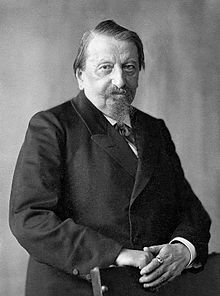Rudolf Gottschall
| Rudolf von Gottschall | |
|---|---|

Rudolf Gottschall by Nicola Perscheid, 1905
|
|
| Born | 30 September 1823 Breslau, Prussia |
| Died | 21 March 1909 (aged 85) Leipzig, Germany |
Rudolf Gottschall (von Gottschall since 1877; 30 September 1823 – 21 March 1909) was a German poet, dramatist, literary critic and literary historian.
He was born at Breslau, the son of a Prussian artillery officer. He was educated at the gymnasia in Mainz and Coburg, and subsequently at Rastenburg in East Prussia. In 1841 he entered the University of Königsberg as a law student, but was expelled for his outspoken liberal opinions. The academic authorities at Breslau and Leipzig were equally intolerant towards him, and it was only in Berlin that he found himself free to pursue his studies. During this period he issued Lieder der Gegenwart (“Songs of the present,” 1842) and Zensurflüchtlinge (“Refugees from censoring,” 1843) - the poetical fruits of his political enthusiasm. He completed his studies in Berlin, and took the degree of doctor juris in Königsberg.
His political views continued to stand in the way of his career, and Gottschall gave up the law to devote himself entirely to literature. He met with immediate success, and beginning as a dramaturge in Königsberg with Der Blinde von Alcala (1846) and Lord Byron in Italien (1847), he went on to Hamburg where he occupied a similar position. His political and social sympathies with the revolutionary movement of 1848 were shown in the dramas Wiener Immortellen (1848), Lambertine von Méricourt (1850), and Ferdinand von Schill (1851), as well as in his first collection of poems, Gedichte (1850), and in a lyric epic, Die Göttin, ein hohes Lied vom Weibe (1853).
In 1852 he married Marie, baroness von Seherr-Thoss, and for the next few years lived in Silesia. From this time on, his work became more serene in temper and style. An epic, Carlo Zeno, was followed by a very successful historical comedy (after the style of Scribe), Pitt und Fox (1854), and this by literary and historical studies, whose final titles were: Die deutsche National Litteratur des XIX. Jahrhunderts (1892) and Poetik: Die Dichtkunst und ihre Formen (1858).
...
Wikipedia
